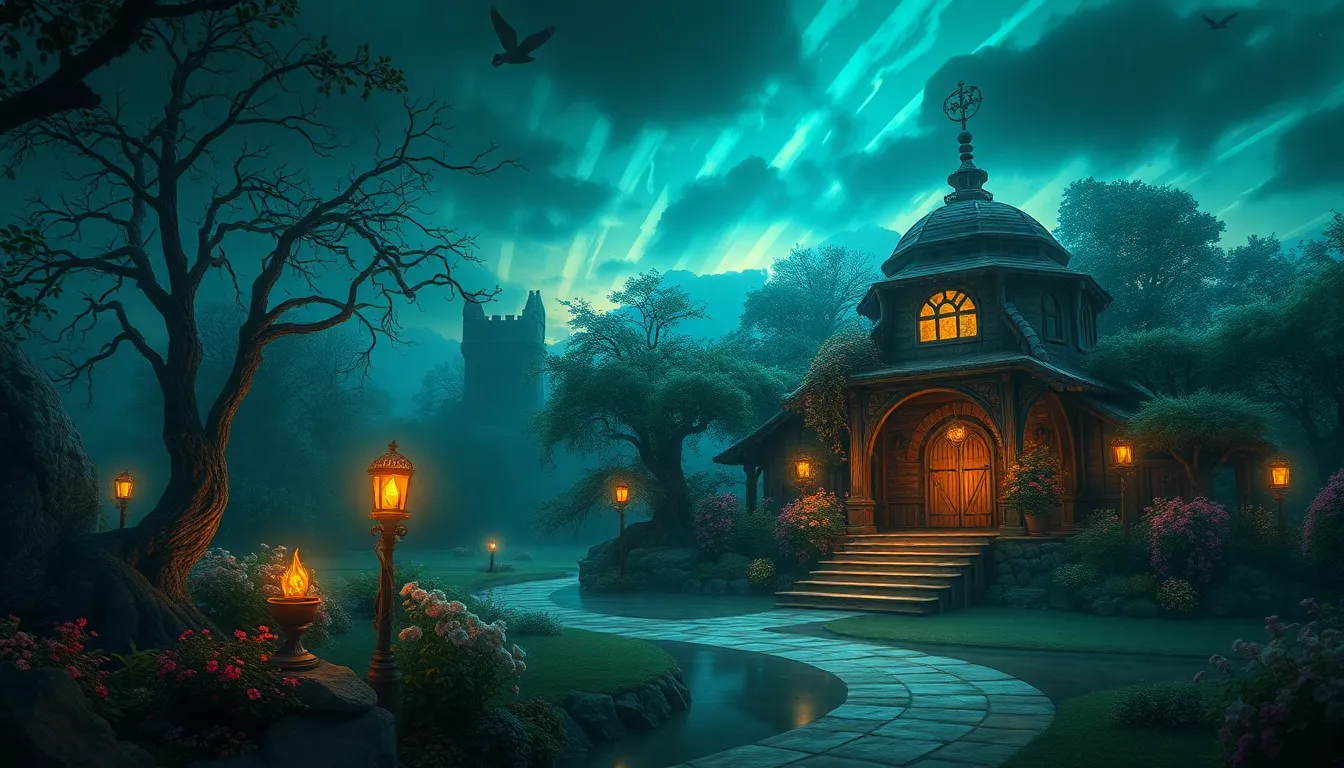The Quest for the Enchanted Garden: Myths of Paradise
Introduction: The Allure of the Enchanted Garden
The concept of the enchanted garden has captivated the imaginations of cultures around the world for centuries. From the lush, mythical landscapes of ancient texts to the serene, cultivated spaces of modern society, gardens symbolize paradise, beauty, and tranquility. They represent a sanctuary where nature thrives and humanity can reconnect with the divine. In mythology and literature, gardens often serve as metaphors for ultimate happiness, spiritual fulfillment, and the human quest for perfection.
Historical Roots: Gardens in Ancient Civilizations
Gardens have played a pivotal role in the cultural and religious practices of ancient civilizations. In Mesopotamia, the Hanging Gardens of Babylon, one of the Seven Wonders of the Ancient World, epitomized the grandeur and complexity of garden design. These terraced gardens were believed to be a testament to human ingenuity and a symbol of paradise.
Similarly, in ancient Egypt, gardens served not only as places of beauty but also as sacred spaces. Often associated with deities, these gardens were filled with plants that had religious significance, such as papyrus and lotus. They were meticulously designed to reflect the Egyptians’ beliefs in the afterlife.
The Persians also contributed to the mythology of gardens with their concept of the “paradise garden” or “pairidaeza.” These enclosed gardens were designed to evoke a sense of peace and were often adorned with water features, symbolizing the flow of life and abundance.
Biblical Paradises: The Garden of Eden
The Garden of Eden is perhaps the most famous garden in Western literature, representing an idyllic state of existence before the fall of man. This biblical paradise is rich with symbolism, illustrating humanity’s original connection to nature and the divine. The narrative of Eden conveys the essence of paradise lost, where innocence and harmony were shattered by disobedience.
The quest for redemption depicted in the Eden story resonates deeply with human aspirations. It reflects the longing for a return to a state of purity and bliss, highlighting the enduring nature of this myth in human consciousness.
Eastern Paradises: The Mythical Gardens of the East
In Eastern traditions, gardens also hold profound significance. In Persian mythology, the Garden of Pleasure is a mythical representation of paradise, characterized by lush greenery, flowing waters, and an abundance of fruit-bearing trees. This garden is a space of joy and sensual pleasure, reflecting the beauty of creation.
In Hindu and Buddhist traditions, gardens symbolize spiritual growth and enlightenment. The concept of “paradise” in these cultures often manifests as the “Garden of Nirvana,” where individuals seek to attain a state of eternal bliss and liberation from the cycle of rebirth. Gardens serve as metaphors for the inner journey towards enlightenment.
The Renaissance and the Rebirth of Garden Aesthetics
The Renaissance marked a significant turning point in garden design and aesthetics. Influenced by humanism, gardens began to reflect the ideals of beauty, proportion, and harmony with nature. Renaissance gardens were meticulously planned, featuring geometric layouts and classical sculptures that celebrated the human form and intellect.
- The Italian Renaissance: Gardens in Italy often included elaborate fountains, hedges, and pathways, creating a theatrical experience for visitors.
- The French Formal Garden: Influenced by Italian designs, French gardens emphasized symmetry and order, exemplified by the gardens of Versailles.
These gardens represented the Renaissance belief in the potential of humanity to shape and improve the natural world, echoing the ancient myths of paradise.
Romanticism and the Enchanted Garden in Literature
The Romantic era brought a renewed fascination with nature and the enchanted garden, as poets and writers explored the relationship between humanity and the natural world. Gardens became spaces for introspection, reflection, and the expression of deep emotions.
- William Wordsworth: His poetry often celebrated the beauty of nature and the transformative power of gardens.
- John Keats: Keats’ imagery frequently intertwined gardens with themes of love, mortality, and the sublime.
For Romantic writers, gardens served as a sanctuary where individuals could connect with their innermost thoughts and feelings, reinforcing the idea of the garden as a mystical space that nurtures the soul.
Contemporary Interpretations: Gardens in Modern Mythology
In contemporary literature and art, the enchanted garden continues to evolve, reflecting modern concerns and aspirations. As society grapples with ecological crises and the loss of natural spaces, gardens are reimagined as symbols of hope and renewal.
Modern interpretations often emphasize sustainable practices and the importance of preserving natural habitats. Artists and writers are drawing on the myth of the enchanted garden to advocate for environmental awareness, creating narratives that inspire stewardship of the earth.
Cultural Variations: Gardens as Universal Symbols
The myth of the enchanted garden transcends geographic boundaries, appearing in various forms across cultures. Common themes and motifs include:
- The notion of gardens as places of refuge and peace.
- The symbolism of water as a source of life and renewal.
- The representation of gardens as spaces for spiritual awakening and connection to the divine.
This comparative analysis reveals a universal yearning for beauty and harmony, illustrating how gardens serve as a shared symbol of human aspiration across cultures.
Personal Journeys: The Quest for Personal Paradises
For many individuals, gardens represent personal sanctuaries where they can escape the chaos of everyday life. The therapeutic role of gardens is increasingly recognized in contemporary society, as people seek solace and healing in nature.
Gardening can be a meditative practice, allowing individuals to connect with the earth and cultivate their inner peace. Personal experiences in gardens often evoke memories, emotions, and a sense of belonging, reinforcing the idea that every garden can be a unique paradise.
Conclusion: The Everlasting Quest for the Enchanted Garden
The myth of the enchanted garden persists as a powerful symbol of human aspiration and hope. Throughout history, gardens have embodied the quest for paradise, reflecting our deepest desires for beauty, connection, and redemption. As we navigate the complexities of modern life, the search for our own enchanted gardens remains a timeless journey—one that invites us to dream, to nurture, and to find solace in the embrace of nature.



